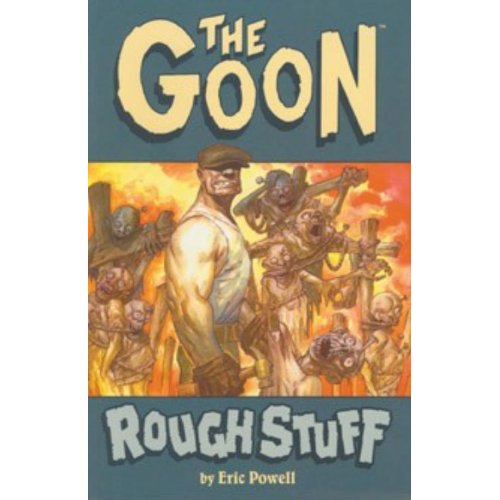 The only more aptly named trade paperback in the Goon library would have to be “Chinatown.â€
The only more aptly named trade paperback in the Goon library would have to be “Chinatown.â€
But that’s not a bad thing.
Collecting the first three issues of the series, before it was picked up by Dark Horse, “Rough Stuff†is indeed a bit dog-eared around the edges, when compared to the uber polished piece of work the series is now, but overall is still an engaging read full of the wit, carnage and hilarity that make Goon and his pals who they are.
With this collection, series creator Eric Powell has given his hardcore fans a great gift, allowing them to see how his characters have changed since he’s added a handful of Eisner awards to his mantle place. Add in the always superb color work of Dave Stewart and a handful of early sketches and strips and this compilation is a must own for anyone who calls themselves a fan of Powell’s work.
Like any dedicated writer and artist, Powell put this book together to show the world just how far he’s come over the years. With Goon and Frankie joking through the first few pages that the whole book is a ploy to make more money, you’ll immediately have a smile on your face. After you witness Frankie bludgeon the duo’s butler, you’ll instantly feel at home.
Because seriously, it wouldn’t be a Goon book if Frankie didn’t get to stab someone, preferably in the eye.
What follows afterward is an interesting tale that serves as the groundwork for the future of the series. Intriguing is the fact that in spite of this being more of an origin story, Powell alludes to some of the major events in the series, making the reader think he’s a mad scientist that had this vision for the character all along. While the art design has changed a bit, leaving more of the Robert Crumb elements to the side in favor of a more retro look, you can still see these changes and that makes for a different type of feel overall.
The same thing goes for the characters, as some have changed entirely from the way their shown here. For example, the Nameless Priest is simply hilarious here, while in the main series, is much more diabolical. The same thing can be said of Merle the Werewolf, who exposes his devious and backstabbing side much quicker than you’d expect [especially considering what his fate in the series eventually is]. Changes like this show how Powell has refined his storytelling ability over the years and make “Rough Stuff,†a more than fulfilling read.
On his worst day, Powell is still one of the best in the world at what he does. Because of that, seeing his literary and artistic vision for this beloved series unfold through these three early issues is a rare treat.
Unlike many people in the comic industry, Powell has not forgotten where he came from; this trade is living proof.


Leave a Reply